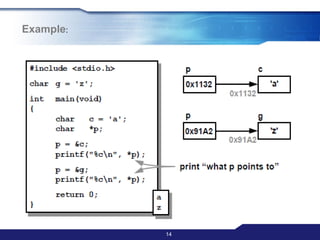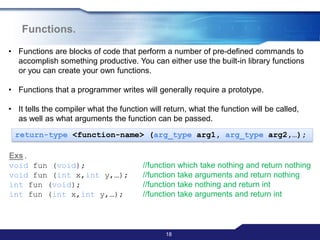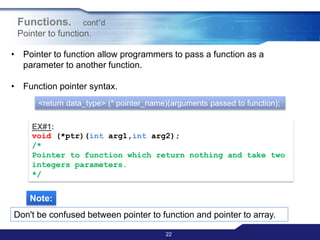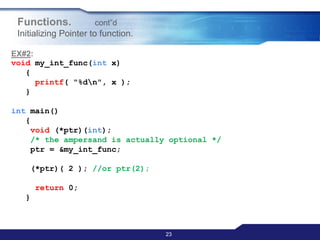C programming day#2.
- 2. 2 Lecture Notes: Set your phone to vibration mode. Ask any time. During labs feel free to check any materials or internet.
- 4. 4 Arrays. which can store a fixed-size sequential collection of elements of the same type. All arrays consist of contiguous memory locations (Single Block). The size of array, once declared, is fixed and cannot be modified. Single Dimension Array. Multi Dimension Array (Array of Arrays). EX: char a[5]; //Array of 5 characters. EX: char a[3][4]; /*Array of three arrays and each array has 4 characters.*/
- 5. 5 Examples: double d[100]={1.5,2.7}; //first two elements initialized and remaining ones set to zero. short num[]={1,2,3,4,5,6}; //compiler fixes size at 7 elements. short num[]={1,2,3,4,5,6}; //compiler fixes size at 7 elements.
- 6. 6 Take Care !!!! #define size 10 int a[size]; char size=10; int a[size]; const char size=10; int a[size]; int a[5.3]; //size must be an integer int a[5]; a[5]=50; //in this case it will overwrite some data. a[-1]=5; //the index must be an integer.
- 7. 7 Control Statements. For Statements. for (initial value;condition;update) { //statements } OR initial value; for(;condition;) { //statements update; }
- 8. 8 Take Care !!!! char x; for(x=0;x<200;x++) { printf(“c programming”); } for(;;) { printf(“c programming”); }
- 9. 9 while loop. while (condition) { //statements } do while loop. do { //statements } while (condition) Control Statements.
- 10. 10 Break & Continue. • Break and continue are used to modify the execution of loops. break. When the break statement is encountered inside a loop, the loop is immediately terminated and program control resumes at the next statement following the loop. Continue. continue forces the next iteration of the loop to take place, skipping any code in between.
- 11. 11 Examples: //program to print even numbers between(0:50) int main() { char x=0; while (x<=50) { if(x%2){ x++; continue; } printf("%dn",x++); } return 0; }
- 12. 12 Pointers. Why pointers? • Achieve call by reference with functions. • Arrays and structures are difficult without pointers. • Create linked list, trees and graph. Note: We must take care in using pointers since, there are no safety features.
- 13. 13 Declaring pointers. • Pointers are declared using “*”. Int x; //declaring an integer Int* x; //declaring pointer to an integer char* m; //declare pointer to character Notes: • Pointers may only point to variables of the same type as the pointer has been declared. • A pointer to an int may only point to int. • A pointer to a double may only point to double not float or long double. • (&) stands for “address of….” • (*) stands for “content of…”
- 14. 14 Example:
- 16. 16 Pointers and arrays. • The name of array is a pointer to the 0th place of array. • You cannot apply increment or decrement on array name. • Pointer is useful for passing array to function and safe stack memory. EX#1: double *ptr; double arr[10]; Ptr=arr; //ptr=&arr[0] arr++; //not allowed ptr++; //allowed EX#2: void print_arr(char *ptr){ printf(“%dn”,*(ptr++)); } . . . . . . . . . . . char arr[10]; Print_arr(arr); Take Care !!!! char *ptr[5]; //array of five pointers to char char (*ptr)[5]; //pointer to array of 5 elements
- 17. 17 EX#3: char (*ptr)[5]; char arr[5] {5,6,7,8,9}; Ptr=arr; ptr++; 5 0 1 2 3 4 5 6 7 8 9 Garbage value
- 18. 18 Functions. • Functions are blocks of code that perform a number of pre-defined commands to accomplish something productive. You can either use the built-in library functions or you can create your own functions. • Functions that a programmer writes will generally require a prototype. • It tells the compiler what the function will return, what the function will be called, as well as what arguments the function can be passed. return-type <function-name> (arg_type arg1, arg_type arg2,…); Exs. void fun (void); //function which take nothing and return nothing void fun (int x,int y,…); //function take arguments and return nothing int fun (void); //function take nothing and return int int fun (int x,int y,…); //function take arguments and return int
- 19. 19 Ex#1. #include <stdio.h> int mult ( int x, int y ); //prototype of function int main() { int x,int y,int result; printf( "Please input two numbers to be multiplied: " ); scanf( "%d", &x ); scanf( "%d", &y ); result= mult(x,y); //calling the function printf( "The product of two numbers is %dn",result); return 0; } //implementation of function int mult (int x, int y) { return x * y; } Functions. cont‟d Pointer to function.
- 20. 20 What happened in calling function? Save some data in memory segment called stack. • the value of PC (Program Counter). • A copy of parameters passed to function. • The value which returned from function. Note: If size of data stored on stack is larger than whole stack size it will cause Common error called “Stack Overflow”. Problem: What if we need to pass a huge data to function to be processed. Solution: We can pass by reference because any pointer only occupy 4 bytes. Functions. cont‟d Calling function.
- 21. 21 Write a c program to calculate the largest number in passed array. #include <studio.h> char calc_largest (char *ptr,char siz) { char largest=*ptr; char i=0; for (i=0;i<siz;i++) { if (*(ptr+i) >largest) largest=*(ptr+i); else continue; } return largest; } int main(){ char arr[]={45,12,5,44,6,8,60} printf(“the largest value is %d”,calc_largest(arr,sizeof(arr)); } Functions. cont‟d
- 22. 22 Functions. cont‟d Pointer to function. • Pointer to function allow programmers to pass a function as a parameter to another function. • Function pointer syntax. <return data_type> (* pointer_name)(arguments passed to function); EX#1: void (*ptr)(int arg1,int arg2); /* Pointer to function which return nothing and take two integers parameters. */ Note: Don't be confused between pointer to function and pointer to array.
- 23. 23 Functions. cont‟d Initializing Pointer to function. EX#2: void my_int_func(int x) { printf( "%dn", x ); } int main() { void (*ptr)(int); /* the ampersand is actually optional */ ptr = &my_int_func; (*ptr)( 2 ); //or ptr(2); return 0; }
- 24. 24 Hands ON
- 25. Email: mo7amed.fawzy33@gmail.com Phone: 01006032792 Facebook: mo7amed_fawzy33@yahoo.com Contact me: 25
- 26. 26




![4
Arrays.
which can store a fixed-size sequential collection of elements of the
same type.
All arrays consist of contiguous memory locations (Single Block).
The size of array, once declared, is fixed and cannot be modified.
Single Dimension Array.
Multi Dimension Array (Array of Arrays).
EX:
char a[5]; //Array of 5 characters.
EX:
char a[3][4];
/*Array of three arrays
and each array has 4 characters.*/](https://image.slidesharecdn.com/cprogrammingday2-150301043626-conversion-gate02/85/C-programming-day-2-4-320.jpg)
![5
Examples:
double d[100]={1.5,2.7};
//first two elements initialized and remaining ones set to zero.
short num[]={1,2,3,4,5,6};
//compiler fixes size at 7 elements.
short num[]={1,2,3,4,5,6};
//compiler fixes size at 7 elements.](https://image.slidesharecdn.com/cprogrammingday2-150301043626-conversion-gate02/85/C-programming-day-2-5-320.jpg)
![6
Take Care !!!!
#define size 10
int a[size];
char size=10;
int a[size];
const char size=10;
int a[size];
int a[5.3];
//size must be an integer
int a[5];
a[5]=50;
//in this case it will overwrite some data.
a[-1]=5;
//the index must be an integer.](https://image.slidesharecdn.com/cprogrammingday2-150301043626-conversion-gate02/85/C-programming-day-2-6-320.jpg)









![16
Pointers and arrays.
• The name of array is a pointer to the 0th place of array.
• You cannot apply increment or decrement on array name.
• Pointer is useful for passing array to function and safe stack memory.
EX#1:
double *ptr;
double arr[10];
Ptr=arr; //ptr=&arr[0]
arr++; //not allowed
ptr++; //allowed
EX#2:
void print_arr(char *ptr){
printf(“%dn”,*(ptr++));
}
. . . . . . . . . . .
char arr[10];
Print_arr(arr);
Take Care !!!!
char *ptr[5]; //array of five pointers to char
char (*ptr)[5]; //pointer to array of 5 elements](https://image.slidesharecdn.com/cprogrammingday2-150301043626-conversion-gate02/85/C-programming-day-2-16-320.jpg)
![17
EX#3:
char (*ptr)[5];
char arr[5] {5,6,7,8,9};
Ptr=arr;
ptr++;
5
0
1
2
3
4
5
6
7
8
9
Garbage value](https://image.slidesharecdn.com/cprogrammingday2-150301043626-conversion-gate02/85/C-programming-day-2-17-320.jpg)



![21
Write a c program to calculate the largest number in passed array.
#include <studio.h>
char calc_largest (char *ptr,char siz)
{
char largest=*ptr;
char i=0;
for (i=0;i<siz;i++)
{
if (*(ptr+i) >largest)
largest=*(ptr+i);
else
continue;
}
return largest;
}
int main(){
char arr[]={45,12,5,44,6,8,60}
printf(“the largest value is %d”,calc_largest(arr,sizeof(arr));
}
Functions. cont‟d](https://image.slidesharecdn.com/cprogrammingday2-150301043626-conversion-gate02/85/C-programming-day-2-21-320.jpg)




